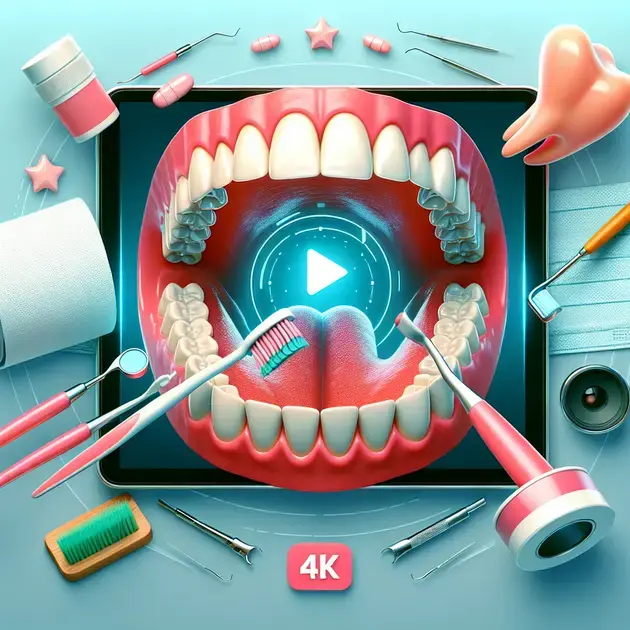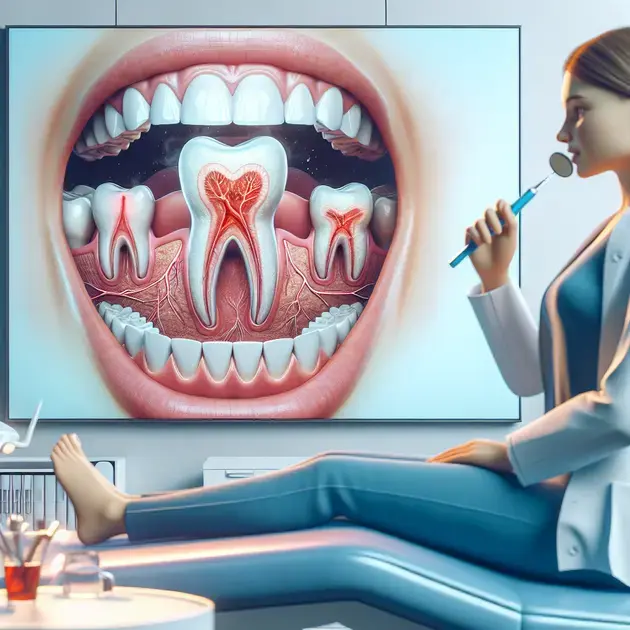It’s essential to be aware of the signs that may indicate you have gum disease. Early detection is key to preventing further complications and maintaining good oral health. According to recent studies, approximately half of adults over 30 in the United States suffer from some form of gum disease.
Some common symptoms to watch out for include red, swollen, or tender gums, bleeding while brushing or flossing, persistent bad breath, and receding gums. If you experience any of these signs, it’s important to consult with a dental professional for an accurate diagnosis and appropriate treatment. Regular dental check-ups and practicing good oral hygiene can help prevent and manage gum disease effectively.

Detecting Gum Disease Early Can Make All the Difference
Gum disease is a common oral health issue that can have serious consequences if left untreated. Detecting gum disease early on is crucial to prevent further damage. One way to detect gum disease early is by paying attention to any changes in your gum health. If you notice any of the following signs, it’s important to see a dentist for further evaluation:
1. Bleeding Gums:
If you experience bleeding gums while brushing or flossing, it could be a sign of gum disease. Pay attention to the frequency of the bleeding and consult with your dentist if it persists.
2. Swollen or Tender Gums:
Swollen or tender gums can indicate an underlying issue with your gum health. If you notice any discomfort or changes in the appearance of your gums, schedule a dental check-up promptly.
3. Receding Gums:
Receding gums can be a sign of gum disease or aggressive brushing habits. Keep an eye on any changes in your gum line and seek professional advice if you notice significant recession.
4. Persistent Bad Breath:
Bad breath that doesn’t go away even with regular brushing and mouthwash could be a sign of gum disease. Addressing the underlying cause is essential for maintaining oral hygiene.
5. Loose Teeth:
If you have loose teeth or a change in your bite pattern, it may be a symptom of advanced gum disease. Seeking treatment early can help prevent tooth loss.
Common Signs and Symptoms of Gum Disease to Look Out For
Understanding the common signs and symptoms of gum disease can help you take proactive steps to maintain your oral health. By recognizing these indicators early on, you can seek appropriate treatment and prevent further complications. Some of the common signs and symptoms of gum disease include:
1. Gum Inflammation:
Inflammation of the gums, characterized by redness and swelling, is a common symptom of gum disease. Regularly check your gums for any signs of inflammation and consult with your dentist if you notice any changes.
2. Gum Recession:
Gum recession occurs when the gum tissue pulls back from the teeth, exposing the roots. This can lead to sensitivity and increased risk of decay. Keep track of any changes in your gum line to detect gum recession early.
3. Pus Between Teeth:
Pus between your teeth and gums is a sign of infection and requires immediate attention. Prolonged presence of pus can lead to abscesses and further complications.
4. Persistent Halitosis:
Chronic bad breath can be a result of gum disease and bacterial buildup in the mouth. Maintaining good oral hygiene practices and seeking treatment for gum disease can help alleviate bad breath.
5. Sensitive Teeth:
Increased tooth sensitivity to hot, cold, or sweet stimuli can indicate gum disease. Schedule a dental check-up if you experience persistent tooth sensitivity to determine the underlying cause.
Why Regular Dental Check-Ups are Crucial for Maintaining Oral Health
Regular dental check-ups play a vital role in maintaining optimal oral health and preventing gum disease. Visiting your dentist at least twice a year can help detect early signs of gum disease and address any issues promptly. Here are some reasons why regular dental check-ups are essential:
1. Professional Cleaning:
Professional dental cleanings remove plaque and tartar buildup that regular brushing and flossing may miss. This helps prevent gum disease and tooth decay.
2. Early Detection of Issues:
Dentists can identify signs of gum disease, cavities, or other oral health issues during routine check-ups. Early detection allows for timely intervention and treatment.
3. Personalized Oral Care:
Your dentist can provide personalized recommendations for maintaining oral hygiene based on your individual needs. This guidance can help prevent gum disease and other oral health problems.
4. Preventive Treatments:
Preventive treatments such as fluoride application or dental sealants can help protect your teeth from decay and strengthen your overall oral health. These treatments are often recommended during regular dental check-ups.
5. Establishing a Routine:
Regular dental check-ups help establish a routine for maintaining oral health. By scheduling consistent appointments, you prioritize your dental care and are more likely to detect and address any issues early on.

Detecting Gum Disease Early Can Make All the Difference
Early detection of gum disease is crucial for maintaining optimal oral health. Gum disease, also known as periodontal disease, is a common condition that can lead to serious consequences if left untreated. By being proactive and aware of the signs and symptoms of gum disease, you can make all the difference in preventing its progression.
One of the key indicators of gum disease is bleeding gums, especially when brushing or flossing. Additionally, swollen or tender gums, persistent bad breath, receding gums, and loose teeth can all be signs of gum disease. If you experience any of these symptoms, it is important to consult with your dentist as soon as possible for a proper diagnosis and treatment plan.
Regular dental check-ups are essential in detecting gum disease early. During these check-ups, your dentist will examine your gums, measure any pockets around the teeth, and assess the overall health of your mouth. By catching gum disease in its early stages, you can avoid more extensive and costly treatments down the line.
Preventive measures such as maintaining good oral hygiene habits, including daily brushing and flossing, as well as regular professional cleanings, can also help in detecting gum disease early. By staying proactive about your oral health, you can make a significant impact on preventing gum disease and preserving your smile for years to come.
Common Signs and Symptoms of Gum Disease to Look Out For
Recognizing the common signs and symptoms of gum disease is essential for early detection and treatment. Bleeding gums, especially during brushing or flossing, are often a key indicator of gum disease. Along with bleeding, other symptoms can include swollen or tender gums, persistent bad breath, receding gums, and loose teeth.
If you notice any of these signs, it is important to schedule a dental check-up to evaluate the health of your gums. Your dentist can assess the condition of your gums, measure any pockets, and recommend appropriate treatment to address the gum disease effectively. Early intervention is key to preventing the progression of gum disease and avoiding potential complications.
In addition to professional dental check-ups, maintaining a consistent oral hygiene routine at home is paramount in preventing gum disease. Regular brushing, flossing, and using an antiseptic mouthwash can help remove plaque and bacteria that contribute to gum disease. By staying vigilant and proactive about your oral health, you can minimize the risk of developing gum disease.
Eating a balanced diet, avoiding tobacco products, and managing stress can also play a role in preventing gum disease. By adopting healthy lifestyle habits and staying vigilant about your oral health, you can protect your gums and overall well-being from the effects of gum disease.
Why Regular Dental Check-Ups are Crucial for Maintaining Oral Health
Scheduling regular dental check-ups is essential for maintaining optimal oral health and detecting any potential issues early on. During a dental check-up, your dentist will examine your teeth, gums, and mouth for signs of decay, gum disease, or other oral health concerns. By attending these check-ups every six months, you can prevent small problems from developing into more serious issues.
One of the primary benefits of regular dental check-ups is the early detection of gum disease. Your dentist can identify the early signs of gum disease, such as inflammation, bleeding gums, and gum recession, before it progresses to a more advanced stage. Early intervention is key in effectively treating gum disease and preventing long-term complications.
Regular dental check-ups also include professional cleanings, which help remove plaque and tartar buildup that can contribute to gum disease. Even with diligent brushing and flossing at home, there are areas of the mouth that are difficult to clean properly without professional tools. By having your teeth professionally cleaned on a regular basis, you can maintain healthy gums and reduce the risk of developing gum disease.
Furthermore, dental check-ups provide an opportunity for your dentist to educate you on proper oral hygiene practices and address any concerns you may have about your oral health. By establishing a trusting relationship with your dentist and attending regular check-ups, you can prioritize your oral health and prevent potential issues from arising. Consistent dental care is essential in preserving your smile and overall well-being for the long term.
Conclusion
Early detection of gum disease plays a crucial role in maintaining optimal oral health. By being proactive and aware of the signs and symptoms such as bleeding gums, swollen or tender gums, bad breath, receding gums, and loose teeth, individuals can take the necessary steps to prevent the progression of gum disease. Regular dental check-ups are an essential component of early detection, allowing dentists to examine the gums, measure pockets, and ensure overall mouth health. By catching gum disease in its early stages, individuals can avoid more extensive and costly treatments in the future.
Recognizing the common signs and symptoms of gum disease, including bleeding gums, swollen gums, and bad breath, is vital for early detection and treatment. Scheduling dental check-ups is crucial for maintaining oral health as dentists can identify gum disease early on and provide appropriate treatment. Additionally, maintaining a consistent oral hygiene routine at home through regular brushing, flossing, and mouthwash usage can help prevent gum disease by removing harmful plaque and bacteria.
In conclusion, regular dental check-ups are essential for preserving oral health and detecting potential issues before they escalate. By attending these check-ups every six months, individuals can benefit from early detection of gum disease, professional cleanings to remove plaque buildup, and valuable education on proper oral hygiene practices. Prioritizing consistent dental care and adopting healthy lifestyle habits can significantly contribute to preventing gum disease and ensuring long-term oral well-being. Remember, your oral health is an integral part of your overall health, so regular dental check-ups are not just a routine but a proactive step towards a healthy and happy smile for years to come!
